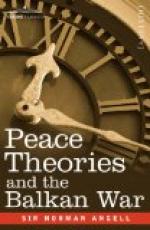Unhappily, one has to ask whether some of these military Pacifists really want it to succeed? Again I do not tax any with conscious insincerity. But it does result not merely from what some imply, but from what they say. For certain of these doughty Pacifists having told you how much their one object is to secure peace, then proceed to tell you that this thing which they hope to secure is a very evil thing, that under its blighting influence nations wane in luxury and sloth. And of course they imply that our own nation, about a third of whom have not enough to eat and about another third of whom have a heart-breaking struggle with small means and precariousness of livelihood, is in danger of this degeneration which comes from too much wealth and luxury and sloth and ease. I could fill a dozen books the size of this with the solemn warning of such Pacifists as these against the danger of peace (which they tell you they are struggling to maintain), and how splendid and glorious a thing, how fine a discipline is war (which they tell you they are trying so hard to avoid). Thus the Editor of The Spectator tells us that mankind cannot yet dispense with the discipline of war; and Lord Roberts, that to make war when you are really ready for it (or that in any case for Germany to do it) is “an excellent policy and one to be pursued by every nation prepared to play a great part in history.”
The truth is, of course, that we are not likely to get peace from those who believe it to be an evil thing and war and aggression a good thing, or, at least, are very mixed in their views as to this. Before men can secure peace they must at least make up their minds whether it is peace or war they want. If you do not know what you want, you are not likely to get it—or you are likely to get it, whichever way you prefer to put it.
And that is another thing which divides us from the military Pacifists: we really do want peace. As between war and peace we have made our choice, and having made it, stick to it. There may be something to be said for war—for settling a thing by fighting about it instead of by understanding it,—just as there may be something to be said for the ordeal, or the duel, as against trial by evidence, for the rack as a corrective of religious error, for judicial torture as a substitute for cross-examination, for religious wars, for all these things—but the balance of advantage is against them and we have discarded them.
But there is a still further difference which divides us: We have realised that we discarded those things only when we really understood their imperfections and that we arrived at that understanding by studying them, by discussing them,—because one man in London or another in Paris raised plainly and boldly the whole question of their wisdom and because the intellectual ferment created by those interrogations, either in the juridical or religious field, re-acted on the minds of men in Geneva or Wurtenburg or Rome or Madrid. It was by this means, not by improving the rapiers or improving the instruments of the inquisition, that we got rid of the duel and that Catholics ceased to torture Protestants or vice versa. We gave these things up because we realised the futility of physical force in these conflicts. We shall give up war for the same reason.




